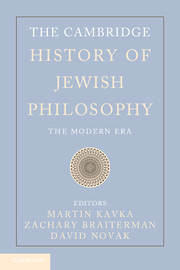Book contents
- Frontmatter
- Contents
- Contributors
- Acknowledgement
- Introduction
- I Judaism's Encounter with Modernity
- II Retrieving Tradition
- III Modern Jewish Philosophical Theology
- IV Jewish Peoplehood
- 16 Reflections on the Challenges Confronting the Philosophy of Halakhah
- 17 Liturgy
- 18 Jews Alongside Non-Jews
- 19 Political Theory: Beyond Sovereignty?
- 20 Zionism
- V Issues in Modern Jewish Philosophy
- Bibliography
- Index
19 - Political Theory: Beyond Sovereignty?
from IV - Jewish Peoplehood
Published online by Cambridge University Press: 28 September 2012
- Frontmatter
- Contents
- Contributors
- Acknowledgement
- Introduction
- I Judaism's Encounter with Modernity
- II Retrieving Tradition
- III Modern Jewish Philosophical Theology
- IV Jewish Peoplehood
- 16 Reflections on the Challenges Confronting the Philosophy of Halakhah
- 17 Liturgy
- 18 Jews Alongside Non-Jews
- 19 Political Theory: Beyond Sovereignty?
- 20 Zionism
- V Issues in Modern Jewish Philosophy
- Bibliography
- Index
Summary
The student of modern Jewish political theory is immediately faced with what may seem an insurmountable problem: almost all modern Jewish philosophers claim that Judaism is not centrally concerned with politics. By this they do not deny that Jewish people have been, and are, involved in modern political life. Rather, they claim that Judaism as Judaism was not historically and is not today concerned with political life. Zionist and non-Zionist Jewish thinkers have both made this claim. For Zionists, Zionism is the rejection of the nonpolitical character of Judaism and the Jewish past. Different as they are, Moses Hess, arguably the first socialist Zionist, and Zvi Yehudah Kook, arguably the first religious Zionist, agree that Jews need to throw off the shackles of exile in order to return Jews and Judaism to the political life of the Jewish nation. In contrast, for non-Zionists, such as Moses Mendelssohn, Hermann Cohen, and Franz Rosenzweig, the nonpolitical character of Judaism allows Jews and Judaism to coexist with (either comfortably with or alienated from) their contemporary political realities. In this way, the Zionist and non-Zionist positions are two sides of the same coin. And clearly, if Judaism is by definition not political, then the attempt to articulate a modern Jewish political theory of any sort would be meaningless at best.
- Type
- Chapter
- Information
- The Cambridge History of Jewish PhilosophyThe Modern Era, pp. 579 - 605Publisher: Cambridge University PressPrint publication year: 2012
- 1
- Cited by



